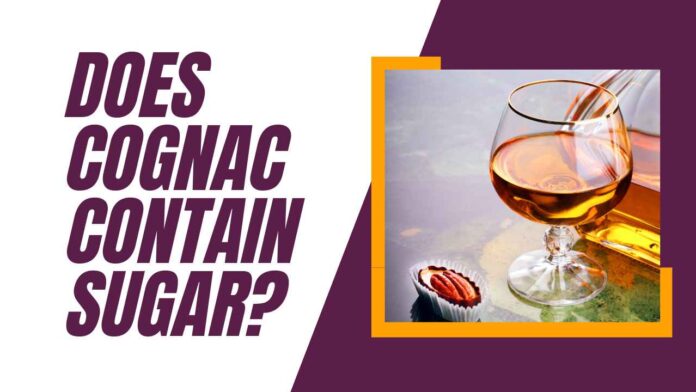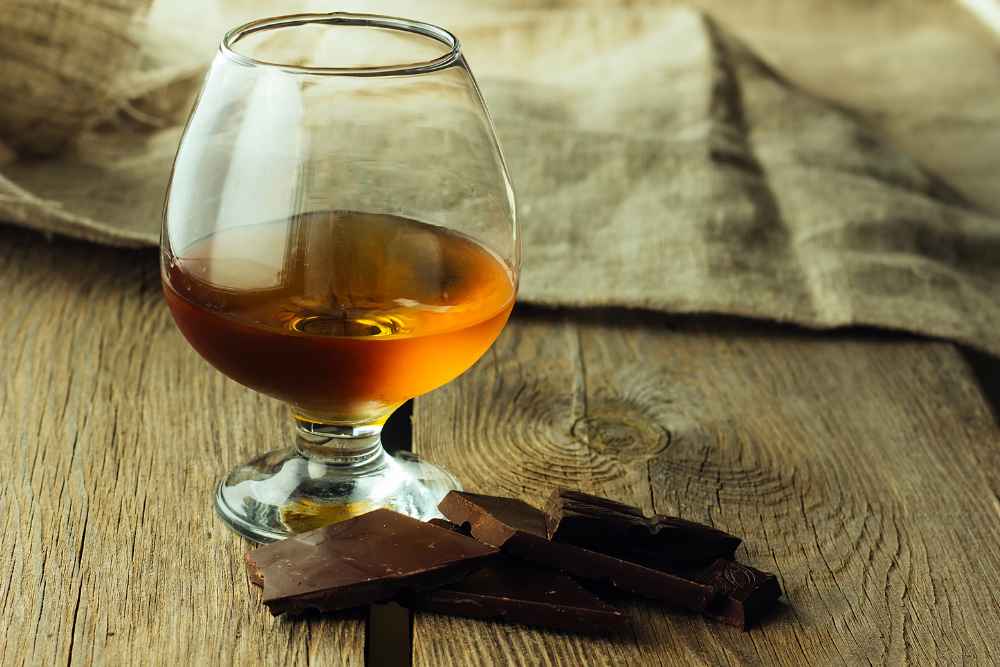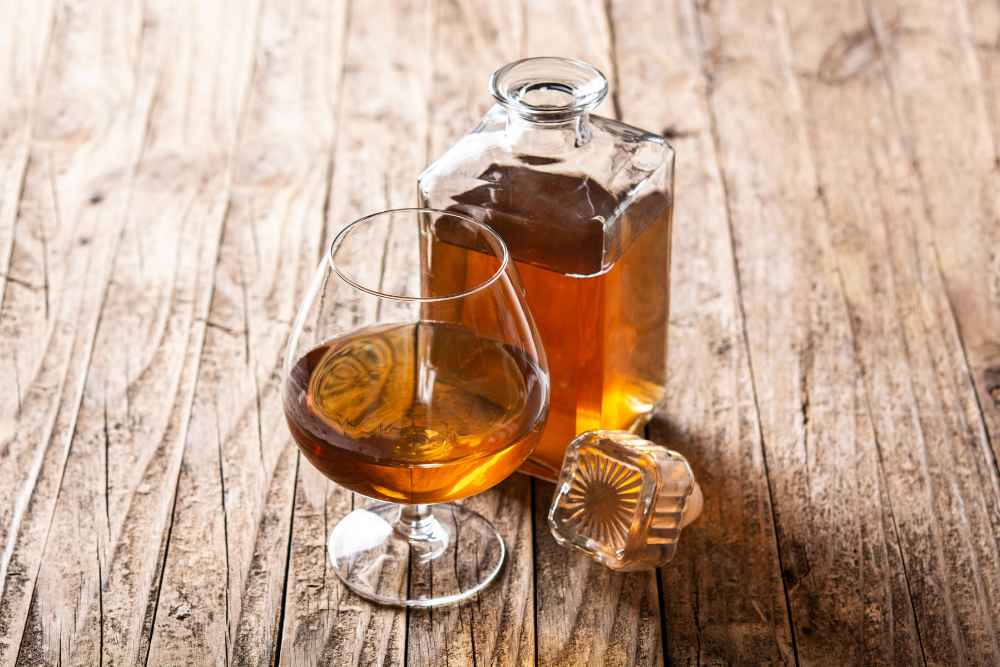This page may contain affiliate links. Please see our Disclaimer for more information. Always drink responsibly and adhere to your local legal drinking age.
Introduction: Debunking The Mystery Of Sugar In Cognac
Cognac, a luxurious type of brandy with its rich flavors and velvety texture, has long been the subject of debate surrounding sugar content. Some enthusiasts insist that cognac is completely void of sugar, while others claim it hides behind that smooth taste.
The truth about sugar in this elegant spirit may surprise you; for all the cocktail drinkers out there seeking clarity on the great cognac mystery – we’ve got you covered! Dive deep into our comprehensive exploration below as we unveil facts and debunk misconceptions about sugar’s presence (or lack thereof) in your favorite after-dinner drink.
Key Takeaways:
- Cognac does contain sugar, but it only comes from natural sources and not added sugars during production.
- The level of sugar in cognac can vary depending on the age and producer preferences, and labeling requirements can help identify the amount of added caramel for color or actual sugar content.
- Personal preference for sweetness plays a significant role in enjoying cognac without added sugar, and pairing it with mixers like ginger ale or water can enhance its flavor profile. Aging also affects the taste profile of different types of cognacs.
- While cognac provides fewer calories than mixed drinks with high sugar content, moderation is essential as it still contains carbohydrates due to its high alcohol content.
Understanding Cognac And Its Production Process
Cognac is a type of brandy made only in the Cognac region of France through a strict production process that includes double distillation and aging in oak barrels.
Definition And Differences Between Cognac And Brandy
Cognac and brandy are distilled spirits derived from fermented fruit juice, typically grapes. However, cognac holds a prestigious status due to its unique production process, which sets it apart from other types of brandy.
Understanding their production processes is crucial for one to truly understand the distinction between cognac and brandy. Both undergo fermentation and distillation; however, cognac goes through double-distillation in copper stills, followed by maturation in oak barrels for at least two years.
This lends a richer depth of flavor and complexity than other brandies, such as Armagnac, or fruit-based varieties like apple or cherry brandy. Moreover, specific aging requirements define various classifications within cognacs — VS (Very Special), VSOP (Very Superior Old Pale), and XO (Extra Old) — signifying the minimum number of years spent in oak barrels before bottling.
The Role Of Sugar In Cognac Production
In cognac production, sugar plays a pivotal but often misunderstood role. To begin with, it’s essential to recognize that chaptalization – the practice of adding sugar to grape juice during fermentation – is strictly forbidden by the Cognac Appellation.
During fermentation, selected yeasts are introduced to convert the grape juice’s natural sugars into alcohol. However, after distillation and aging, producers can add up to 8 grams of sugar per liter to their final product as part of the dilution and additives permitted in cognac production.
The addition can include caramel coloring and oak extract called boisé for flavor and color enhancement.
Essentially, when it comes to determining whether your favorite cognac contains added sugar or not will depend on factors like age grade classification (VS vs VSOP), producer preferences for taste profiles, and overall desired mouthfeel experience.
The Great Sugar Debate: The Truth About Sugar Content In Cognac
Many people debate whether or not cognac contains sugar, but the truth is revealed in this section, with varying opinions and misconceptions debunked alongside scientific evidence and facts unveiled.
Varying Opinions And Misconceptions Debunked
Cognac’s sugar content has long been debated and confused among cocktail drinkers. Various opinions and misguided beliefs have only fueled the controversy, leading to misconceptions that need to be debunked.
Not all cognacs have additional sugars beyond those naturally present in grapes. The production process typically involves fermenting grape juice into wine, followed by distillation to create eaux-de-vie (clear fruit brandy). It then matures in oak barrels before blending into the final product – cognac itself.
While it is true that some producers add sugar during this process for flavor enhancement or color stabilization purposes, these additions are minimal and regulated by law.
Scientific Evidence And Facts Unveiled
There has been a great debate surrounding the sugar content in cognac, with some people mistakenly believing it contains added sugar. However, scientific evidence and facts have unveiled that this is not true.
Cognac is made by distilling wine from grapes grown in specific regions of France known as the Cognac region.
It is important to note that while cognac does not contain added sugar, it still has carbohydrates due to its high alcohol content. One standard serving of 1.5 ounces contains around 1-2 grams of carbs.
This means that individuals following a keto or low-carb diet should monitor their consumption in moderation.
When enjoying cognac without any mixers or additions such as juice or soda with high sugar content, it can be consumed relatively guilt-free compared to mixed drinks like rum and coke or margaritas, which can contain dozens if not hundreds more calories than one serving of cognac alone.
Decoding Cognac Labels: How To Identify Sugar Content
Understanding its labeling requirements and analyzing taste and color is crucial to identifying the cognac’s sugar content.
Understanding Classifications And Labeling Requirements
To truly understand the sugar content in cognac, it’s crucial to examine classifications and labeling requirements closely. Cognacs are classified into VS (very special), VSOP (very superior old pale), and XO (extra old), depending on their age.
Additionally, cognac labels may list the “sugar content” or “sugar.” Still, it’s important to remember that these terms may refer to adding caramel for color rather than actual sugar content.
For instance, if you’re looking for a low-sugar option, consider selecting a VSOP or XO classification, which typically has fewer added sugars due to their longer aging process.
When analyzing taste and color, darker hues may indicate higher levels of added caramel, while lighter colors suggest less.
Analyzing Taste And Color To Determine Sugar Content
To determine the sugar content in cognac, you can analyze its taste and color. Here are some tips:
- Sweetness: Cognacs with higher sugar content will taste sweeter than those with lower sugar content. If you want a less sweet option, try VS or VSOP cognacs.
- Color: Cognacs that are darker in color tend to have more sugar than lighter-colored cognacs. This is because as cognac ages, it rounds out the flavors and colors by oxidizing tannins and creating caramel compounds.
- Aroma: The aroma of cognac can also indicate its sugar level, with sweeter cognacs typically having a more floral and fruity scent.
- Labeling: To be sure about the sugar content of your cognac, always check the label for “sugar” or “sugar content.” This information should be listed on the back label or provided upon request.
- Personal preference: Ultimately, your choice of sweetness will play a significant role in determining which cognac is right for you. If you prefer a sweeter drink, look for XO or older vintage options.
Remember that while some liquors may contain added sugar, cognac is not one of them – it is made purely from fermented grapes without any additional sugars added during production.
Enjoying Cognac Without Sugar: Tips And Recommendations
Discovering the perfect cognac without added sugar can be a delightful and enriching experience that will please any cocktail lover. From selecting a type of cognac to pairing it with complementary flavors, our tips and recommendations will help you enjoy your drink even more.
Personal Preferences For Sweetness
When it comes to enjoying cognac, personal preferences for sweetness play a significant role. Some cocktail drinkers enjoy their cognac with added sugar or syrup to balance its dryness, while others prefer the pure and natural taste without any sweeteners.
If you prefer a sweeter taste in your drinks, there are options beyond adding sugar. Consider pairing your cognac with ginger ale or lemonade mixers for a more refreshing and fruity flavor.
On the other hand, if you’re looking to enjoy cognac without any added sugars or syrups, plenty of options are available. Look for VSOP or XO varieties that have been aged longer, as they tend to have a smoother texture and richer flavor profile that can make them more enjoyable.
Additionally, consider trying different types of cognacs from various regions, as they can offer different sweetness levels depending on how they were produced.
Selecting The Right Cognac For Your Palate
When choosing a cognac, remember that everyone’s tastes are different. Here are some tips to help you select the right cognac for your palate:
- Consider the age of the cognac. Younger cognacs tend to be fruitier and have lighter body, while older cognacs have more depth and complexity.
- Look at the label for information on the type of cognac. VS (very special) and VSOP (very superior old pale) are younger cognacs, while XO (extra old) is aged for a more extended period.
- Think about your flavor preferences. Do you prefer earthy or floral notes? Do you like a smooth, mellow finish or something with more bite?
- Don’t forget about mouthfeel. Some prefer a thick, chewy texture, while others enjoy something lighter and crisper.
- Consider pairing your cognac with food. Certain types of cognac go well with different foods, so think about what you’ll be eating alongside your drink.
Remember, there is no “right” or “wrong” way to enjoy cognac – it’s all about personal taste. Try out different types and see what works best for you.
Pairing Cognac With Complimentary Flavors
Cognac’s rich, complex flavor profile can be further elevated by pairing it with complimentary flavors. Here are some tips for enhancing your cognac drinking experience:
- Rich, hearty flavors like red meat or aged Parmesan bring out the best in cognac.
- Chocolate and caramel pair well with sweeter cognacs for a decadent dessert experience.
- Spicy foods like Asian cuisine or Indian curry can balance the richness of cognac with its bold flavors.
- Fruits like figs, apples, or pears can add a touch of sweetness to your cognac without overpowering it.
- For a unique twist, pair cognac with herbs like rosemary or thyme for a savory complement to the spirit.
By experimenting with different food combinations, you can unlock new facets of flavor in your favorite cognacs and enhance your overall drinking experience. And remember, as one of four legal additives in Cognac production, sugar is unnecessary to enjoy this fine spirit to its fullest extent.
Implications For Health And Nutrition: Carb And Sugar Content, Glycemic Index, And Diabetes
Learn about the nutritional value of Cognac and its carb and sugar content, as well as its implications for those with diabetes.
Understanding The Nutritional Value Of Cognac
Cognac is often considered a luxurious alcoholic beverage, but how does it fare regarding nutrition? The good news is that cognac has zero carbohydrates and no added sugar or fat.
This makes it an excellent choice for those following a keto diet or looking to watch their calorie intake. A standard serving of cognac (1.5 ounces) contains less than 100 calories.
Monitoring Carb And Sugar Intake
It is important to keep track of your carb and sugar intake when enjoying cognac or any alcoholic beverage. The number of carbs and sugar can vary depending on the type of cognac, so it’s important to read labels and research.
For example, VSOP cognacs typically have less than 2 grams of carbs per serving, while liqueurs may contain added sugar that significantly increases their carb content.
People with diabetes should closely monitor their blood sugar levels when consuming alcohol, including cognac, as it can impact glycemic load and index.
Enjoying Cognac Responsibly And Informed.
When it comes to enjoying cognac, moderation is key. While the low carb and sugar content in cognac makes it an excellent option for those on a keto diet or watching their calorie intake, excessive consumption can adversely affect your health.
Additionally, incorporating cognac into cocktails or mixed drinks can increase the overall calorie count and sugar content. To enjoy cognac responsibly and informed, consider sipping it straight or adding just a splash of water to enhance its flavors without increasing the calorie count.
FAQ
Q: Does cognac contain sugar?
A: Yes, cognac may contain small amounts of sugar, but the added sugar is usually minimal and primarily added during fermentation to balance out the taste. However, most cognacs do not have any sugar added during the distillation process and contain zero or very little sugar.
Q: Is cognac high in calories?
A: Cognac is a type of alcoholic drink that is relatively high in calories, with about 97-150 calories per shot, depending on the type and quality of the cognac. This makes it a calorie-dense drink that can quickly add up if consumed in large amounts or as part of a heavy drinking session.
Q: How many calories are in cognac?
A: On average, one shot (1.5 oz) of cognac contains about 97-150 calories, depending on the specific type and quality. However, it is important to note that consuming excessive amounts of any alcoholic drink can contribute to weight gain and other health issues.
Q: Does cognac contain carbs or carbohydrates?
A: Cognac contains trace amounts of carbohydrates, usually less than 1.5 grams per shot. This is due to the natural sugars in the grapes used to make the eau-de-vie that is the base for cognac. However, the amount of carbs in cognac is negligible compared to other popular alcoholic drinks like beer and sweet liqueurs.
Q: How much alcohol is in cognac?
A: Cognac has a relatively high alcohol content, typically 40-60% ABV (alcohol by volume). This means that consuming large amounts of cognac can increase blood alcohol levels and associated effects like impairment, dehydration, and related risks.
Q: Can cognac make you fat or fatten you up?
A: While consuming excessive amounts of cognac (or any alcoholic drink) can indirectly contribute to weight gain due to the added calories and associated effects like dehydration and inflammation, cognac does not contain any ingredients that would cause you to gain weight or “fatten up.” However, it is important to consume cognac in moderation and as part of a balanced diet to maintain overall health and well-being.
Q: Is cognac keto-friendly?
A: Cognac is generally considered keto-friendly, as it contains very low amounts of carbs and sugar per serving. However, as with any alcoholic drink, cognac should be consumed in moderation as part of a balanced keto diet to avoid exceeding your daily calorie and carb limits.
Q: How is cognac made?
A: Cognac is made by distilling white wine from specific types of grapes grown in the Cognac region of France. After fermentation, the wine is distilled twice in copper pot stills to create a clear alcohol called eau-de-vie. The eau-de-vie is then aged for at least two years in oak barrels to create the final product known as cognac.
Q: Does cognac contain more or fewer calories than other types of alcohol?
A: Cognac contains about the same amount of calories per serving as other types of distilled spirits like vodka, whiskey, gin, and tequila. However, it tends to be higher in calories than lower-alcohol drinks like red wine and beer.
Q: Is sugar added to cognac during production?
A: Cognac does not generally contain added sugars like other liqueurs and sweet mixers. However, some lower-quality cognacs may have small amounts of sugar added during production to balance out the flavors or mask harshness. These additions are typically minimal and unlikely to significantly impact the nutritional content or taste of the final product.
Conclusion
After exploring the complexities of sugar in cognac, we can confidently say that cognac contains sugar. While some may try to argue the opposite, scientific evidence and labeling requirements make it clear that sugar plays a role in cognac production.
However, this doesn’t mean you can’t enjoy a glass of cognac without added sugars. By selecting the right type and paying attention to taste and color indicators, you can find a cognac that suits your preferences for sweetness.





















